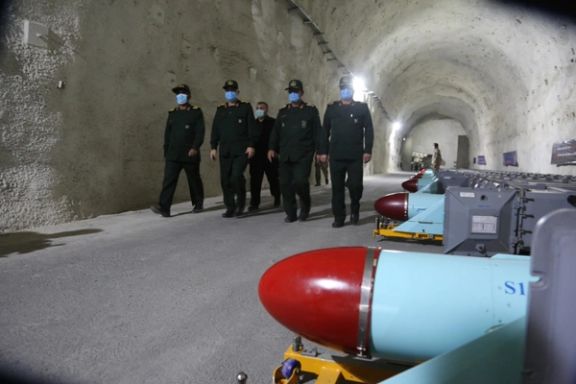Tehran Slams UK Foreign Office For 'Meddling Statement' On Iran Missiles

Iran's foreign ministry Friday evening slammed the British foreign office's statement in condemnation of Iran's ballistic missiles, calling it "meddlesome".

Iran's foreign ministry Friday evening slammed the British foreign office's statement in condemnation of Iran's ballistic missiles, calling it "meddlesome".
"Iran has not designed its missiles for nuclear purposes since it did not have and does not have any plans to use nuclear energy militarily,” spokesman Saeed Khatibzadeh said in a statement, claiming that the peacefulness of Iran's nuclear program is completely evidenced by the International Atomic Energy Agency (IAEA).
“The British know better than anyone else that Iran's missile program has nothing to do with UN Security Council Resolution 2231 and its provisions,” Khatibzadeh said, while accusing Britain of practically violating the UNSC resolution through “arbitrary interpretation.”
In a statement Friday, the foreign office condemned Iran's use of ballistic missiles in a test launch which it said was confirmed to have been conducted on the same day. "The launch is a clear breach of UN Security Council Resolution 2231, which requires that Iran not undertake any activity related to ballistic missiles designed to be capable of delivering nuclear weapons – including launches using ballistic missile technology," the statement said.
The 2015 resolution which sanctioned Iran's nuclear agreement, Joint Comprehensive Plan of Action (JCPOA), called upon Iran "not to undertake any activity related to ballistic missiles designed to be capable of delivering nuclear weapons, including launches using such ballistic missile technology".
Iran's Revolutionary Guards (IRGC) on Friday simultaneously launched 16 ballistic missiles on the last day of largescale five-day military exercises dubbed Great Prophet 17 in in the Persian Gulf region, the Strait of Hormuz, as well as the coastal areas of the southern province of Hormozgan, Bushehr, and Khuzestan.
The UK Foreign Office called the test launch of the missiles "a threat to regional and international security" and urged Iran to immediate cease such activities.
Chief of the Armed Forces' Joint Staff Major General Mohammad Bagheri (Baqeri) Friday described the exercises as "the most successful missile [launch] exercises so far" and said they were "an appropriate response to the Israeli regime’s latest empty threats".
“The message of this exercise is a serious and real warning to the threats of the Zionist regime officials,” the IRGC Commander-in-Chief Major General Hossein Salami also warned Friday. "The difference between real operations and the IRGC's missile launch exercises is only a matter of adjusting the launch gradient [towards Israel]."
In recent weeks Iran and Israel have escalated their war rhetoric against each other. Israel staunchly opposes the revival of the JCPOA. US National Security Adviser Jake Sullivan and Israeli Prime Minister Naftali Bennett Wednesday discussed Iran and the ongoing nuclear talks, stressing the need for a joint strategy.
Israeli officials have repeatedly said Israel has the capability to strike Iran's nuclear facilities. The incoming commander of the Israeli air force, Major General Tomer Bar, said Wednesday that if need be, Israel can successfully destroy Iran’s nuclear facilities “tomorrow.”
Iran's missile capabilities are also a cause of great concern to Saudi Arabia and other regional countries. The CNN reported Friday that it has learned that the US intelligence agencies have assessed that Saudi Arabia, Iran's regional rival, is also now actively manufacturing its own ballistic missiles with the help of China. This can complicate Western efforts to limit Iran’s missile program, as Tehran can claim other regional countries should also give up their ballistic missiles.